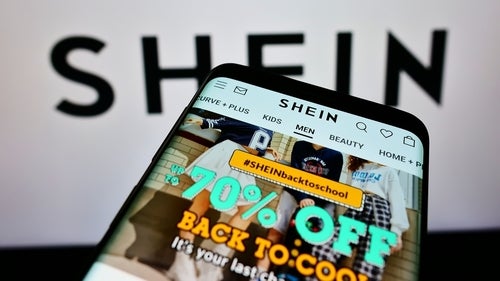Advantage based on technology alone doesn't last forever
Without a strong brand providing defence, customers have zero loyalty to smart technology.

Shein - now valued at over $100 billion - took the fast-fashion industry by storm by taking advantage of Guangdong’s tight network wholesalers and workshops.
Shein's pitch to Gen Z consumers is very simple - super-cheap fashion items that are trending in this very moment, available directly to-your-door.
See it on TikTok and buy it now.
Shein is by all accounts, driving the entire clothing industry in China. It is Southern China's most important global marketplace, numerous massive clothing megafactories in the region produce product for no other company - so there is a lot riding on its success.
How does Shein win?
For decades, China’s textile workforce has provided low-cost, quick-turnaround garments to global brands like H&M and Zara. But the Shein has found ways to squeeze the system even further, using reams of consumer data to inform every move.
While Zara’s garments go from drawing board to shipping container in three weeks, the fast-fashion behemoth demands a turnaround of just 10 days.
It also relies on contractors rather than investing in its own manufacturing facilities, ordering batches of as few as 50 pieces. It’s an approach that enables the brand to respond quickly to customer interest—or lack of it—in any given item, and to launch tens of thousands of pieces every day.
The company’s data collection goes way beyond sales trends, though. It monitors social media for viral looks that can be quickly copied, tracks users’ browsing history and keeps tabs on reviews and fashion events. A customer might see their favorite celebrity on TikTok in a puff-sleeve blouse or drop-shoulder dress, then within days be offered a near-identical style on Shein’s website, thanks to a powerful recommendations algorithm that analyzes users’ profiles, online habits and historical data. - via Bloomberg
New competitors
Shein however is not immune to competitors with deeper pockets, copying its model and stealing customers.
Temu is a global online shopping platform that 'borrows' from the Shein operating model, but casts the net much wider to include other verticals like homeware and pet accessories.
Temu competes by allowing customers to buy directly from Chinese manufactures and 'has an annual active user base of 880 million and controls roughly 13% of Chinese online retail.'
Temu has also been actively targeting the apparel giant’s Guangzhou suppliers as potential partners, according to people familiar with the situation, and attempting to lure employees from its supply-chain department by offering to triple their compensation packages. Pinduoduo has a deep pool of resources to call on—both financially and in terms of skills such as supply-chain management—that increases the risk it presents to Shein. - via Bloomberg
Technology and business model innovation can create value incredibly quickly, but that same value can easily shift to a new platform almost instantaneously should the conditions be right to facilitate that transition.
There is zero customer loyalty in technology alone.
The takeout






